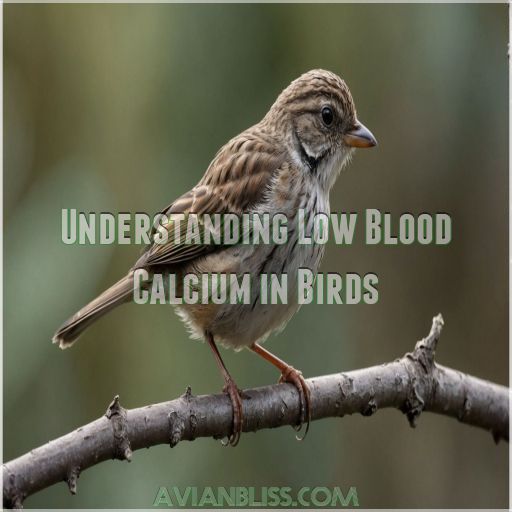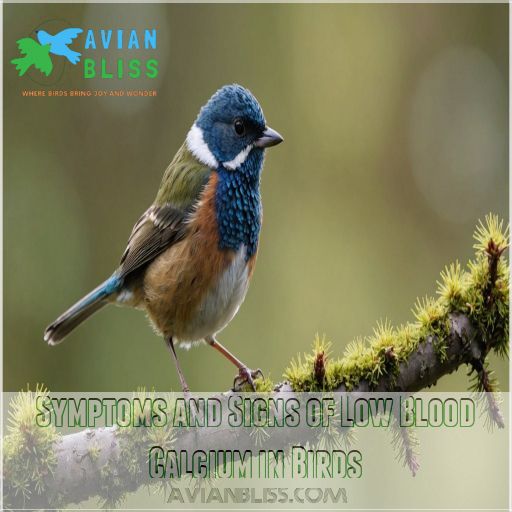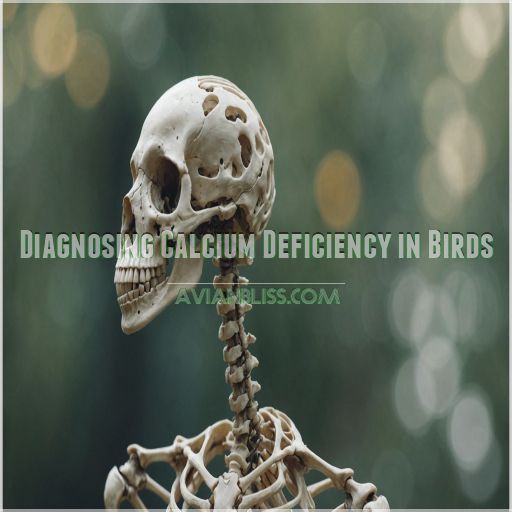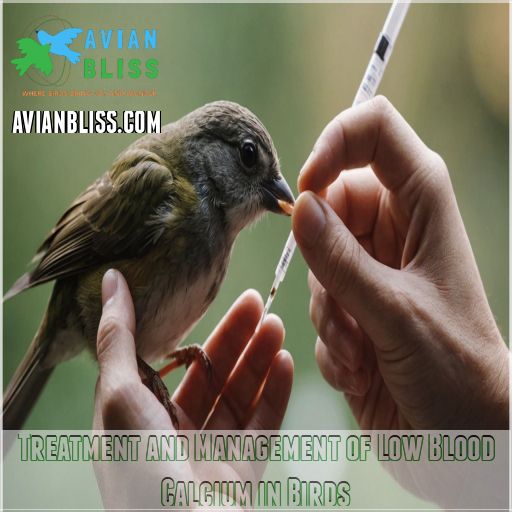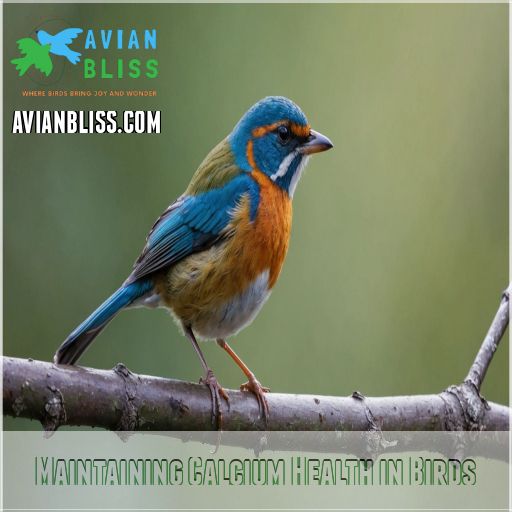This site is supported by our readers. We may earn a commission, at no cost to you, if you purchase through links.

Without enough vitamin D from sunlight, these feathered friends can’t absorb calcium efficiently. Tweaking their diet or adding supplements can help balance the scales. If Polly’s acting wobbly, it’s time for an avian vet check-up. Curious how to manage your bird’s calcium levels better? Read on!
Table Of Contents
- Key Takeaways
- Understanding Low Blood Calcium in Birds
- Common Causes of Calcium Deficiency
- Symptoms and Signs of Low Blood Calcium in Birds
- Diagnosing Calcium Deficiency in Birds
- Treatment and Management of Low Blood Calcium in Birds
- Providing Dietary Calcium for Birds
- Special Considerations for Specific Bird Species
- Maintaining Calcium Health in Birds
- Frequently Asked Questions (FAQs)
- What causes calcium deficiency in birds?
- How do you treat hypocalcemia in birds?
- How do you increase calcium in birds?
- What 2 signs are indicative of low blood calcium level?
- How can I monitor my birds calcium levels at home?
- What are the long-term effects of chronic calcium deficiency in birds?
- How do I ensure proper calcium absorption in my birds diet?
- Can certain medications or health conditions affect a birds calcium levels?
- What are the best calcium-rich food sources for different bird species?
- Conclusion
Key Takeaways
- Don’t let your bird end up with bones like marshmallows! Keep their calcium levels up to prevent weak bones, soft-shelled eggs, and even seizures. Consider tweaking their diet or adding supplements if they’re on a seed-heavy diet.
- Vitamin D, crucial for strong bones and calcium absorption through UVB lighting for birds, plays a significant role in a bird’s overall health. Just like you need sun for vitamin D, so do birds! Without enough of it, they can’t absorb calcium properly. Make sure your feathered friend gets some sunny time or supplements.
- To fix a calcium crisis quickly, a dash of calcium gluconate can help. You can go the daily DIY route with powdered calcium or consult a vet for possible injections if needed.
- Keep an eagle eye on your bird’s behavior and egg quality to spot calcium trouble early. If your bird’s looking wobbly or their eggs are too soft, it might be time for a vet visit.
Understanding Low Blood Calcium in Birds
Understanding common bird diseases symptoms, such as ruffled feathers and labored breathing, can help identify potential health issues, like diseases from contaminated food. Understanding low blood calcium in birds is important because it can lead to serious health problems like weak bones and even seizures.
You wouldn’t want your feathered friends to have a skeleton made of marshmallows, would you?
Defining Calcium and Its Role in Avian Health
Think of calcium as the unsung hero of your bird’s health. It’s key for:
- Bone Health: Think of a brick house needing mortar.
- Metabolism Magic: Fuels daily life.
- Egg Shell Strength: Protects future chicks.
- Calcium Absorption: Important for skeletal calcification.
Consequences of Insufficient Calcium Levels in Birds
When birds face low blood calcium levels, it’s like walking on eggshells.
Expect bone weakness, muscle tremors, and leg weakness.
Egg production plummets with poor shell quality, leading to egg binding.
These issues can severely reduce a bird’s lifespan.
Difference Between Hypocalcemia and Low Blood Calcium
Hypocalcemia refers to critically low blood calcium, while low blood calcium simply indicates suboptimal levels.
Understanding the distinction is key for proper clinical diagnosis and treatment options to prevent complications in your birds.
Common Causes of Calcium Deficiency
You might be surprised to learn that your bird’s diet could be sabotaging its calcium levels, with an improper balance in nutrients doing more harm than you’d think.
Don’t worry, though—understanding how vitamin D and phosphorus play into this equation is easier than unscrambling an egg.
Diet And Calcium Sources
Finding the right balance in your bird’s diet is key!
Seed-based diets might seem like a good idea, but they often miss calcium-rich foods.
Pair pickstones and grit with calcium supplements to help offset dietary phosphorus issues, ensuring healthy bones.
Impact Of Vitamin D
Vitamin D plays a key role in calcium absorption and metabolism in birds.
Insufficient vitamin D, often due to lack of sunlight exposure, can lead to calcium deficiency affecting the skeletal system.
Make sure birds receive proper Vitamin D3 supplementation and sunlight.
Phosphoruss Role In Deficiency
You know, phosphorus plays a sneaky role in calcium deficiency.
Too much phosphorus can interfere with calcium absorption, leading to weak bones and other issues.
Keep an eye on that phosphorus-calcium ratio, my feathered friends!
Symptoms and Signs of Low Blood Calcium in Birds
When your bird’s calcium levels drop, you might notice signs like weakness or lethargy that mirror your own post-gym exhaustion.
Just don’t expect them to lift weights, though you may spot symptoms like soft-shelled eggs or even the occasional erratic parrot dance from muscle twitching, seizures, or ataxia that definitely aren’t part of any new bird exercise regime (Source).
General Symptoms, Such as Weakness and Lethargy
When birds lack calcium, you might notice weakness and lethargy creeping in like unexpected guests at a quiet afternoon tea.
They may appear fatigued, stumbling around with difficulty walking, or even showing signs of posterior paralysis.
Don’t ignore these red flags!
Musculoskeletal Symptoms, Such as Soft-Shelled Eggs or Bent Keels
Struggling with flimsy formations, birds with low blood calcium often experience skeletal issues like soft-shelled eggs or bent keels. These symptoms challenge:
- Eggshell quality
- Keel bone health
- Bone development
- Thin, brittle cortices
- Sternum deformities
Neurological Symptoms, Such as Seizures or Ataxia
Struggling with your bird’s wobbly steps or sudden seizures? Don’t panic – these neurological symptoms may signal low blood calcium. Let’s explore the causes and how to get your feathered friend back on track.
Proper calcium supplementation and lighting can help restore your bird’s health. Stay vigilant, and consult an avian vet if symptoms persist.
| Symptom | Cause |
|---|---|
| Ataxia | Impaired nerve and muscle function |
| Seizures | Disrupted calcium-dependent nerve activity |
Diagnosing Calcium Deficiency in Birds
You might think your bird’s just being dramatic, but those fainting spells could be telling you it’s low on calcium!
Determining calcium deficiency involves simple blood tests and a good look at their diet, so grab a comfy chair and prepare to play detective.
Serum Calcium Levels and Blood Tests
Ever wonder how blood tests determine calcium deficiency in birds?
They’re important, checking serum calcium levels against reference ranges.
Regular testing helps make sure accuracy and understanding of normal values, guiding treatment—especially when using supplements like Dac’s Greenline tablets or mineral blends.
Clinical Signs and Physical Examination
After testing serum calcium, a physical exam uncovers clinical signs like muscle weakness, bone deformities, or even pendulous crop.
Watch for behavioral changes or egg quality issues too.
Weighing your feathered friend helps manage body weight for good health.
Dietary Evaluation and Environmental Assessment
Next, you’ll want to closely evaluate your bird’s diet and environment.
Check calcium and phosphorus levels in their food, water quality, and whether feeders are consistently full.
Assess their housing setup and overall liver health too.
Treatment and Management of Low Blood Calcium in Birds
Managing low blood calcium in birds isn’t as scary as it sounds; with quick treatment like calcium administration, your feathered friend can be back on its perch in no time.
Long-term lifestyle changes, such as dietary tweaks and regular check-ups, to help them stay chirpy and healthy.
Immediate Treatment, Such as Calcium Administration
Imagine your bird’s panic during a calcium crisis—swift action is key!
Administer calcium gluconate immediately; choose between injection or oral administration.
Here’s a quick guide:
| Method | Dosage | Frequency | Pros | Cons |
|---|---|---|---|---|
| Injection | Consult vet | As directed | Fast-acting | Vet-needed |
| Oral | As per guide | Daily | DIY | Slower |
Ensure emergency care and consider calcium’s role alongside parathyroid hormone and UVB exposure.
Long-term Management, Such as Dietary Changes or Calcium Supplementation
Managing low blood calcium takes more than a quick fix. You’ll need to embrace long-term strategies for resilient, feathered friends.
- Calcium-rich food sources
- Smart supplementing strategies
- Enhance calcium absorption
- Diet modifications
- Account for hormonal changes during the breeding season
Monitoring and Follow-up Care
Closely monitoring your bird’s calcium levels and overall health is really important.
Regularly check for changes in egg quality, bone strength, and behavior.
Don’t hesitate to consult an avian vet if you have any concerns.
Your feathered friend’s wellbeing is in your caring hands.
Providing Dietary Calcium for Birds
If you want to keep your feathered friends healthy and avoid the drama of low blood calcium, making sure they get enough dietary calcium is really important.
Think of it like keeping their bones and beaks in tip-top shape—after all, no one wants a bird with soft eggshells or wobbly perches!
Balancing Calcium-to-Phosphorus Ratio in Bird Diets
Balancing the calcium-to-phosphorus ratio in bird diets is no bird-brained task! You need just the right mix:
- Phosphorus-rich foods: Limit nuts and seeds to avoid excess dietary phosphorus.
- Egg-laying birds: Boost calcium intake, as they’re high-demanding.
- Calcium supplementation: Provide cuttlebone or eggshell powder for extra crunch.
Using Commercial Bird Diets and Calcium Supplements
Diving into commercial diets, you’ll find they’re like a buffet for birds, but with hidden ingredients to watch. Ingredient analysis and brand comparisons help make sure safety.
Picking the right supplement type is important—it’s like choosing the perfect dance partner!
Dosage concerns aren’t a waltz; they’re a serious tango, so always make sure you have the right steps for your bird’s health.
Special Considerations for Specific Bird Species
While birds may seem similar, their calcium needs can vary greatly by species.
From parrots’ unique challenges to dietary adjustments for different avian groups,
understanding these nuances is key to keeping your feathered friends happy and healthy.
Calcium Needs Differences
Bird life stages vary wildly, and so do calcium needs. Here’s a quick rundown:
- Young Birds: Require extra calcium for strong bones.
- Breeding Season: Calcium boosts egg production.
- Older Birds: Less demand but still important.
- Species Specific: Different needs altogether!
Diet Adjustments Per Species
When tailoring diets for specific birds, remember one size doesn’t fit all!
Here’s a quick guide to help you navigate diet adjustments:
| Bird Type | Calcium Source |
|---|---|
| Seed-eating birds | Cuttlefish bone |
| Herbivores | Leafy greens |
| Omnivore diets | Crushed eggshells |
| Insectivores | Calcium powder |
Adapt accordingly for each group’s unique calcium needs!
Unique Challenges In Parrots
Every parrot owner knows the quirky challenges of keeping calcium levels up, particularly with African grey parrots prone to hypocalcemic syndrome due to seed-based diets.
UVB exposure helps with bone mobilization and calcium absorption, keeping your feathered friend healthy.
Maintaining Calcium Health in Birds
Maintaining your bird’s calcium health is essential for their overall well-being.
Calcium levels and providing a balanced diet with calcium-rich foods and supplements can help keep your feathered friend happy and healthy. (Source)
Regular Monitoring of Calcium Levels and Bird Health
Each bird has unique calcium needs. Monitoring is your best friend here. Look out for calcium testing to keep your feathery pals in tip-top shape.
Here’s a simple checklist:
- Observe bird behavior for any oddities.
- Check egg quality frequently.
- Consult your vet for diet analysis and calcium levels.
Keep your birds happy with these easy steps!
Providing a Balanced Diet and Calcium-Rich Environment
Make sure you provide **calcium-rich foods** and make sure your birds eat a variety in their diet, as birds require a balanced calcium and phosphorus ratio for strong bones.
Think of it as a mineral buffet!
Balancing calcium sources is like lining up ducks in a row, essential for their health.
Don’t forget environmental enrichment—birdie yoga anyone? It keeps them pecking and perching happily, making sure mineral balance remains a top priority.
Frequently Asked Questions (FAQs)
What causes calcium deficiency in birds?
Birds face calcium deficiency, often from diets lacking calcium, excess phosphorus, or insufficient vitamin D.
Imagine a bird trying to lay eggs without enough building blocks—it’s like baking a cake without flour!
How do you treat hypocalcemia in birds?
Hypocalcemia affects 1 in 10 birds, so treat it by giving calcium-rich foods or supplements.
Offer oyster shells or cuttlebone, like serving a tasty buffet.
Address diet quality and consult a vet for personalized guidance.
How do you increase calcium in birds?
Boost your bird’s calcium by adding powdered calcium or calcium gluconate liquid to their water, or by offering grit with oyster shell.
Like Grandma always said, "A balanced diet makes for a balanced bird!
What 2 signs are indicative of low blood calcium level?
Did you know that birds with low calcium levels can experience weakness and seizures?
These two telltale signs indicate your feathered friend may need a calcium boost to stay healthy and happy.
How can I monitor my birds calcium levels at home?
Check your bird’s egg quality and bone strength regularly.
If eggshells are soft or skeletons underdeveloped, it’s time for action!
Monitor behavior for any weakness or mobility issues.
When in doubt, call your friendly neighborhood vet.
What are the long-term effects of chronic calcium deficiency in birds?
Imagine a bird trying to walk a tightrope with spaghetti legs.
Chronic calcium deficiency can lead to weak bones, egg-binding, and nervous system issues.
Over time, this lack of calcium wreaks havoc on your feathered friend’s health.
How do I ensure proper calcium absorption in my birds diet?
To boost calcium absorption in your bird’s diet, provide vitamin D through sunlight.
Make sure you have a balanced calcium-phosphorus ratio.
Offer dietary supplements like cuttlebone or liquid calcium.
Include calcium-rich foods like broccoli and kale.
Can certain medications or health conditions affect a birds calcium levels?
Certain medications like diuretics and health conditions like kidney disease can impact your bird’s calcium levels. Work closely with your avian vet to monitor and manage any calcium imbalances. (Source)
What are the best calcium-rich food sources for different bird species?
Offer birds calcium-rich foods like cuttlebone, crushed oyster shell, and fortified pellets.
Dark leafy greens and eggshells provide a natural boost.
Just remember, moderation’s key, or they’ll be richer in calcium than a moose in antlers!
Conclusion
When your bird’s life’s a little wobbly, low blood calcium levels in birds might be ruffling its feathers.
With proper care, tweaking diets, and maybe a bit of birdie yoga, you’ll help Polly soar smoothly again.
Remember, a balanced diet with calcium and vitamin D is your feathered friend’s safety net, especially when feeding orphaned baby birds.
Partner with your vet for regular check-ups, and focus on their unique needs. Stay proactive, and Polly will be flying high in no time!

